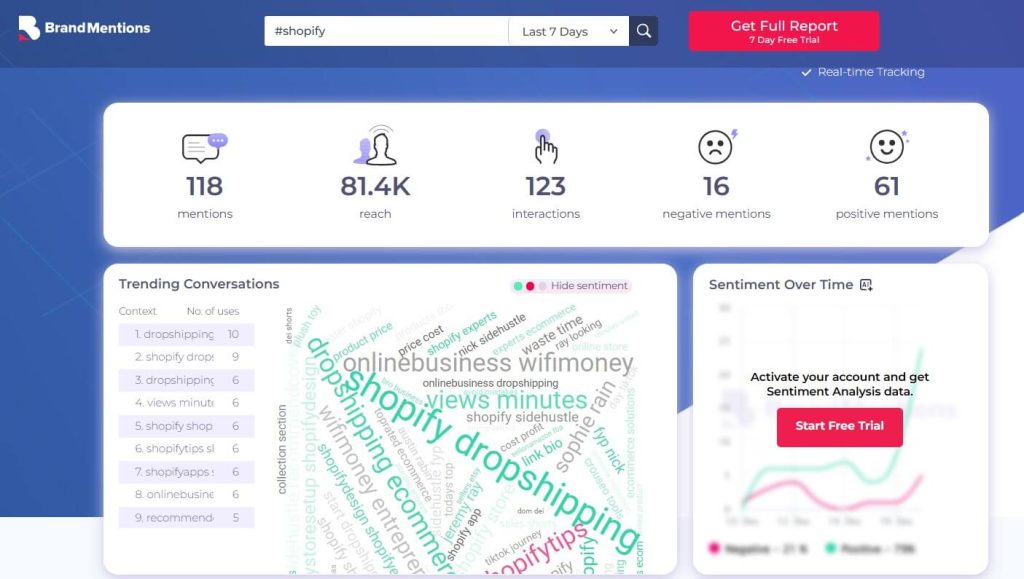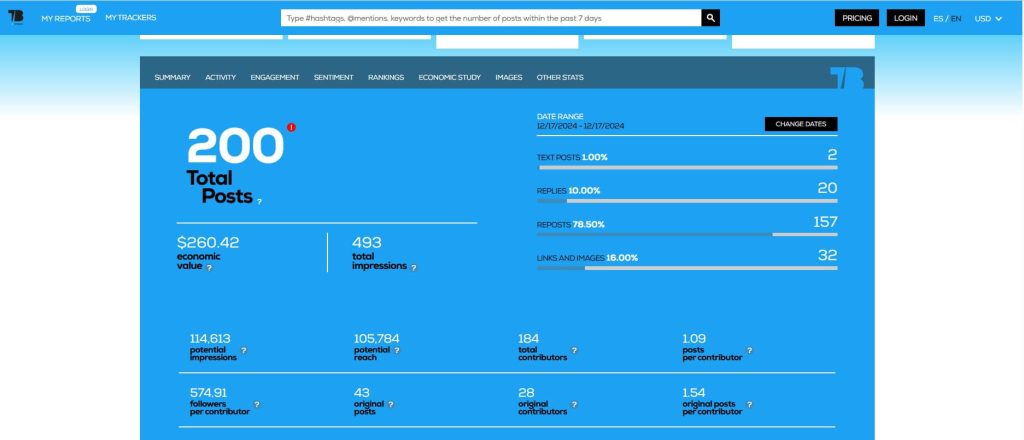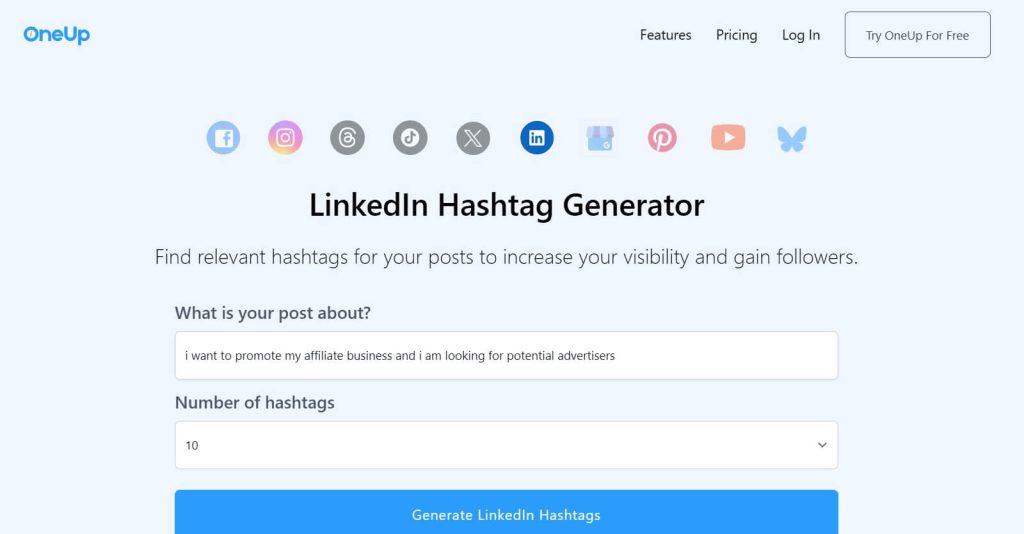Using affiliate marketing hashtags strategically will expand your reach. Hashtags are powerful tools that categorize content, make posts discoverable, and help you connect with the right audience.
This guide will explore the different types of affiliate marketing hashtags – affiliate disclosure, brand hashtags, and content hashtags & how to use them on social platforms.

Why do you need hashtags while doing affiliate marketing?
Hashtags are not just a trendy feature on social media – they’re essential tools for increasing visibility, driving traffic, and enhancing your affiliate marketing efforts.
Hashtags make your content discoverable to a wider audience. When users search for or follow specific hashtags, they can find posts related to their interests. By using the right affiliate marketing hashtags, you can reach potential customers who are actively looking for content relevant to the products or services you’re promoting. When your posts are tagged with relevant hashtags, they have a better chance of being seen by users beyond your current followers.
Hashtags also allow you to target specific groups or niches. For example, using hashtags like #beautyproducts or #techgadgets can help you connect with people interested in those areas.
Hashtags help you track the success of your affiliate marketing campaigns. You can monitor which hashtags generate the most engagement, which platforms work best, and which products resonate with your audience. This data allows you to refine your strategy and improve your future campaigns.
03 types of hashtags in affiliate marketing
Hashtags in affiliate marketing can be categorized into three main types: affiliate disclosure hashtags, brand hashtags, and content hashtags. Each type serves a unique purpose and plays a significant role in maximizing the effectiveness of your affiliate marketing efforts.
1. Affiliate disclosure hashtags
Affiliate disclosure hashtags are essential for maintaining transparency and building trust with your audience. These hashtags are required by regulatory bodies, such as the Federal Trade Commission (FTC) in the U.S., to indicate that a post contains affiliate links. By using these hashtags, you ensure that your audience knows you may earn a commission if they purchase through your links. Using affiliate disclosure hashtags helps protect you legally and enhances your credibility. It shows you are upfront and transparent about your affiliate relationships.
Remember these hashtags should be visible to your audience to comply with legal standards and make your affiliate relationships clear.
2. Brand hashtags
Brand hashtags help in associating your posts with the specific brands or products you are promoting. These hashtags may be provided by the brand or company for affiliates to use to track performance, campaigns, or giveaways. Using brand hashtags increases your visibility within the brand’s own community, which could result in greater exposure and engagement. It also helps the brand track affiliate performance more effectively.
Look for any official hashtags provided by the brand or company you’re affiliated with and add them to your posts. These hashtags should be used consistently across your content, especially when promoting specific products or services.
Here are some examples of brand hashtags: #justdoit (Nike) #forever21 (Forever21) #chanel
3. Content hashtags
Content hashtags focus on the specific content of your post, such as the niche, theme, or product you’re promoting. These hashtags are essential for targeting a specific audience who are likely to be interested in your content, even if they don’t follow your account.
Using relevant content hashtags can increase the visibility of your post, reaching a more targeted audience who shares an interest in the type of content you’re posting. It helps your affiliate content stand out and attract potential customers who are more likely to engage with your affiliate links.
You should choose content hashtags that reflect the main themes or topics of your post. Whether it’s a product review, tutorial, or brand promotion, using specific and niche hashtags allows your post to reach people searching for that type of content.
Examples of content hashtags: #fashion #fitness #beautyblogger #techgadgets #travelblogger #momlife
Each of these hashtag types serves an important role in affiliate marketing, helping you stay compliant, connect with your audience, and maximize your affiliate marketing potential. Next, let’s dive into how to properly use affiliate disclosure hashtags and their placements on different social media platforms.
Best hashtags for affiliate marketing
Let’s dive into how to properly use affiliate disclosure and social media platform hashtags.
Affiliate disclosure hashtags
Affiliate disclosure hashtags are a crucial part of maintaining transparency in affiliate marketing. These hashtags are essential for adhering to legal guidelines and ensuring your audience is aware that you may earn a commission if they purchase through your affiliate links.
Some examples of affiliate disclosure hashtags: #ad #sponsored #partner #promotion #affiliatecode #adpartner #afflink #partnership #collab #partnership #gifted
To maintain transparency, your audience should easily understand and see that the post contains affiliate links. Here are some key placements for these hashtags:
- At the beginning of the post: Many social media platforms, especially Instagram and Twitter, display the first few lines of a post before a user needs to click “more.” By placing your disclosure hashtag at the beginning, you ensure that your audience sees it immediately, without having to scroll through the entire post.
- Within the body of the post: For platforms like LinkedIn or Facebook, placing your disclosure hashtag in the middle of the post is often effective. This ensures that it’s visible without cluttering the first impression of the post, especially when you include multiple hashtags.
- At the end of the post: While this placement is more common on platforms like Instagram, where the first few lines are crucial, placing your disclosure hashtag at the end can also be effective. Just ensure that the disclosure is visible before the user scrolls past the post, as they may miss it otherwise.
- In stories: On platforms like Instagram and Facebook, when posting stories, you can add affiliate disclosure hashtags within the image or video, along with text, stickers, or GIFs. This makes the disclosure more noticeable and integrated into the content.
- In your bio: If you frequently use affiliate links, it’s helpful to add a permanent affiliate disclosure in your bio on Instagram, Twitter, and other platforms. This disclosure reinforces transparency to anyone visiting your profile, letting them know your content may contain affiliate links.
Follow the guidelines set by regulatory bodies such as the FTC to avoid legal issues. They recommend clear disclosure to ensure your audience is informed.
Social media hashtags
Social media hashtags are a powerful tool for increasing visibility and engagement in affiliate marketing campaigns. Each platform has its own culture and best practices for using hashtags, so tailoring your hashtag strategy is essential.
There are a lot of tool for hashtags, research on cross-channels so you can learn what is trending right now. For example, BrandMentions.

X (Twitter)
Hashtags on X (formerly Twitter) allow affiliate marketers to increase the reach of their tweets, especially for product launches, promotions, or affiliate deals. They should be short, to the point, and trend-focused. You can also use various tool to create research for the best hashtags. In this example, I use tweetbinder to check the #shopify hashtag on X.

Some popular examples:
#deals #affiliates #productlaunch #onlinedeals #ecommercedeals
#moneymaking #discountcodes #bestdresses #bestskincareproduct #hottopic
LinkedIn is primarily a professional networking platform, so hashtags should be used in a more business-oriented way. Focus on industry-specific hashtags or those related to professional growth and expertise.
10 examples:
#affiliatemarketing #digitalmarketing #B2B #onlinemarketing #contentMarketing #leadgeneration #salesstrategy #brandpartnerships #businessgrowth #socialmediastrategy
Focusing on professional and niche-related tags. You can use a mix of broad and specific hashtags to reach a wider audience while targeting relevant prospects.
You can also have a look at LinkedIN hashtag generator tool, which will save you a lot time researching.

Hashtags on Facebook aren’t as commonly used as on platforms like Instagram, but they can still be effective when used strategically. Put hashtags ideally at the end of your content. Focus on local or trending hashtags to connect with specific audiences.
Here are some examples:
#affiliatedeals #shopnow #ad #onlineshopping #productreview
#dealalert #specialoffer #travelvouchers #buy1get1 #freegift
YouTube
YouTube hashtags help viewers find videos on specific topics, making them an essential part of affiliate marketing strategies, especially when reviewing products or services.
10 examples:
#affiliatemarketing #productreview #howto #ecommercetips #affiliateincome
#earnmoneyonline #bestproducts #amazonffiliate #passiveIncome #tutorial
You can add hashtags in the video description or title. Focus on highly relevant tags for product reviews, tutorials, or affiliate tips. Use keywords in your hashtags that people might search for when looking for similar content.
Instagram is one of the most popular platforms for affiliate marketing due to its visual nature. Effective use of hashtags can help increase your visibility and engagement.
Some examples of hashtags for affiliate marketing on Instagram:
#affiliates #ad #instadeal #productreview #brandambassador #shopthelook
#fashionaffiliate #instasale #ootd #bestlook
You can place hashtags either in the post or the first comment to keep it clean. Mix popular hashtags with niche ones to reach both broad and targeted audiences. You should use hashtags that are relevant to your post’s theme or the product you’re promoting.
Pinterest is a visual discovery engine, and hashtags play a key role in categorizing your pins and helping users discover your content. They are particularly useful for affiliate marketers in niches like fashion, beauty, or home decor.
10 examples:
#affiliate #shopthelook #productreview #homedecordeals #fashionfinds
#beautyproducts #nail #hairstyle #makeuptutorial #homeImprovement #outfit
Choose niche-specific hashtags that directly relate to your pin’s content. Include hashtags that reflect trending topics to increase discoverability.
What is the ideal number of hashtags in affiliate marketing?
The ideal number of hashtags in affiliate marketing varies depending on the platform and your goals. While hashtags are an effective way to increase visibility, using too many can make posts look spammy and decrease engagement.
Here’s a guide on the optimal number of hashtags for each social media platform and how to strike the right balance.
- Instagram is one of the most popular platforms for affiliate marketing, and it allows users to add up to 30 hashtags per post. However, research suggests that using around 5 to 15 hashtags is ideal for increasing engagement while avoiding clutter.
- On Twitter (now X), posts are limited to 280 characters, so the optimal number of hashtags is around 2 to 5 per tweet. Using more than this can make the post look over-optimized and may not result in the best engagement.
- Since Facebook’s algorithm prioritizes user interaction, adding too many hashtags can overwhelm the post and distract from the content. Using around 1 to 3 hashtags per post is generally effective.
- On LinkedIn, hashtags are primarily used to categorize posts and make them discoverable to a specific audience. LinkedIn is a professional networking platform, so the number of hashtags should be kept to a minimum. Using around 2 to 5 hashtags per post is the most effective.
- YouTube’s search algorithm uses hashtags to recommend videos, but too many hashtags can be seen as keyword stuffing. By using 3-5 hashtags, you can increase your video’s chances of appearing in search results and suggested videos.
- Pinterest uses hashtags to help users find pins related to specific topics. Too many hashtags can make the pin look cluttered while using too few can limit its visibility. The ideal number of hashtags is around 3 to 6 hashtags per pin.
Always ensure your hashtags are relevant to the content you’re posting and the audience you want to reach. Overusing hashtags can result in lower engagement. Use the optimal number of hashtags for each platform to strike a balance between visibility and quality.
You should monitor which hashtags are getting the best results and adjust your strategy accordingly.
Should you use the brand’s name in the hashtags?
When it comes to affiliate marketing, it’s generally not recommended to use the brand’s official name as a hashtag in your posts. Brands typically provide specific hashtags to affiliates for tracking and performance measurement, separate from the ones they use in their own marketing materials.
Brands have control over how their official hashtags are used in their marketing efforts. Affiliate marketers should use the brand’s designated hashtags instead to avoid mixing content with the brand’s main social media presence.
You should ask your affiliate manager for any specific hashtags designed for affiliates. Use these hashtags consistently across all relevant social media platforms. Always ensure that your affiliate hashtags align with the campaign’s objectives (e.g., product launch, seasonal sale).
Hashtags in affiliate marketing for better engagement
Hashtags are a powerful tool in affiliate marketing, allowing you to increase visibility, reach a broader audience, and connect with potential customers more effectively. Whether you’re promoting products on Instagram, Twitter, LinkedIn, or other social media platforms, using the right hashtags can help your content stand out and drive more targeted traffic to your affiliate links.
From affiliate disclosure hashtags to content-specific and brand-related tags, each type serves a unique purpose in enhancing your affiliate marketing efforts. Remember to focus on quality over quantity when selecting hashtags, and ensure they are relevant to your niche and audience.
By strategically choosing the right number of hashtags for each platform, you can amplify your affiliate marketing strategy, improve your content’s discoverability, and ultimately drive higher conversions. Keep experimenting with new hashtag combinations and track their performance to refine your approach and boost your affiliate marketing success.